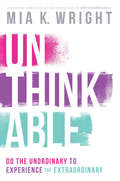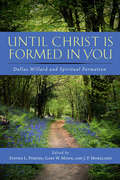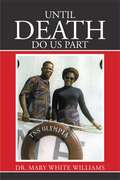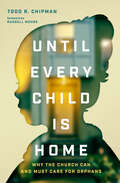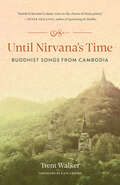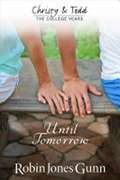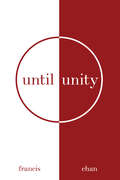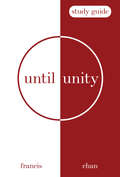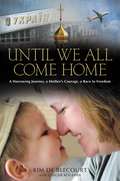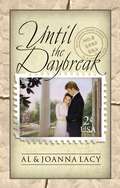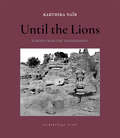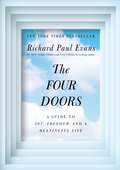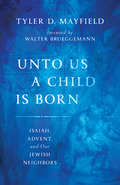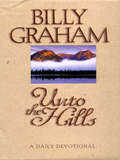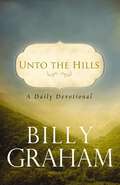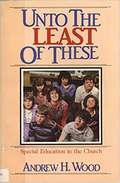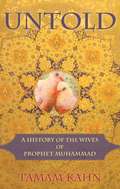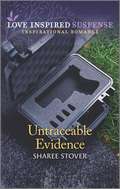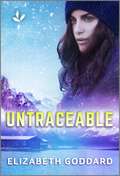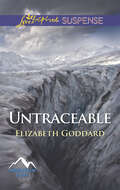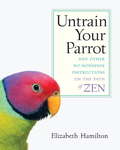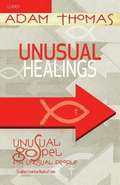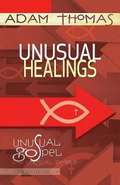- Table View
- List View
Unthinkable: Do the Unordinary to Experience the Extraordinary
by Mia K. WrightMary should have been in the kitchen with Martha, but she sat at the feet of Jesus. When Naomi commanded her daughters-in-law to go back home, Ruth vowed to stay with her and thus played a central role in God&’s plan to bring Jesus into the world. These stories inspired Mia K. Wright to overcome her personal odds and establish a new paradigm for her life. Studying the Bible, she recognized a pattern; the people who experienced the extraordinary did unordinary things. They pushed past the limitations and rules placed upon them by society, culture, and themselves. Wright challenges you to break out of the mold and join hands with the One whose dreams are bigger than you think.DON'T SETTLE FOR THE STATUS QUO. GOD WANTS TO DO SO MUCH MORE WITH YOUR LIFE. Unthinkable shows what happens when you get out of your comfort zone and trust in God alone.
Until Christ Is Formed in You: Dallas Willard and Spiritual Formation
by J. P. Moreland Gary W. Moon Steven L. PorterBecause Transformation Is Possible. At a popular level, Dallas Willard wrote with remarkable clarity about spiritual formation. But his writings also addressed academic concerns such as shifts in modern moral philosophy, the nature of education, and the psychology of the human self. Until Christ Is Formed in You brings together ten authors who knew Willard well to introduce his wide-ranging vision and consider again the overall significance of this one-of-a-kind teacher. This collection explores topics including the Beatitudes, the relationship of body and soul, the kingdom of God, discipleship to Jesus, the nature of formation, and Ignatian spirituality. The book begins with a comprehensive overview of Willard's understanding of formation, and it concludes with practical applications of this understanding to the disciplines of psychology and counseling.
Until Death Do Us Part
by Mary White WilliamsThere are many people who no longer believe in the sanctity of the marriage bond or the traditional wedding ceremony. Some have said that going through a wedding ceremony is a waste of time-why bother? Why go through the hassle of getting a marriage license or a blood test? I have an answer for all of those who may think those thoughts, or who may dare to ask those questions. First of all, you cannot drive a car, fly an airplane, or go hunting or fishing without a license. Getting a license allows an individual the privilege, the right, and the legal permission to do something. Living together without legal documentation is settling for less than God's best for you. In fact, it is an offense to God. “Common-law” marriage or “shacking,” although widely practiced and accepted in some states, is not a marriage in the sight of God. What it really is, is two people coming together-cohabiting without legal documentation. God's desire is for all of us to live happy and satisfied lives whether we choose to marry or remain single. In marriage, a couple can live together without guilt, thus honoring God. Hebrews 13:4 says, “Let marriage be held in honor (esteemed worthy, precious, of great price, and especially dear) in all things. And thus let the marriage bed be undefiled (kept undishonored), for God will judge and punish the unchaste [all guilty of sexual vice] and adulterous” (The Amplified Bible). Until Death Do Us Part was written as a guide for all who are satisfied in their singleness, for those who are believing God for that special person, and for those who desire a more fulfilling marriage.
Until Every Child Is Home: Why the Church Can and Must Care for Orphans
by Todd R. Chipman&“A wise and experienced guide, Todd Chipman offers practical direction on how local congregations can do better in our quest to care for those Jesus calls &‘the least of these my brothers.&’&” –Russell Moore, author of Adopted for LifeYour church is doing so much already. Trying to convince people to do foster care or adoption can feel like just another daunting, impossible task. It&’s hard enough to get volunteers for the nursery, much less volunteers to foster or adopt a child!But what if we&’re thinking about it the wrong way? What if orphan care actually increases your church&’s capacity to do ministry? What if this one ministry opens doors to many others? Discover how orphan care transforms 6 key aspects of your ministry, meet dozens of families and churches who have experienced the transformative power of orphan care, and learn how you can get involved even if you&’re not ready to foster or adopt. After catching the vision for this vital ministry, you&’ll be ready to join them!
Until Every Child Is Home: Why the Church Can and Must Care for Orphans
by Todd R. Chipman&“A wise and experienced guide, Todd Chipman offers practical direction on how local congregations can do better in our quest to care for those Jesus calls &‘the least of these my brothers.&’&” –Russell Moore, author of Adopted for LifeYour church is doing so much already. Trying to convince people to do foster care or adoption can feel like just another daunting, impossible task. It&’s hard enough to get volunteers for the nursery, much less volunteers to foster or adopt a child!But what if we&’re thinking about it the wrong way? What if orphan care actually increases your church&’s capacity to do ministry? What if this one ministry opens doors to many others? Discover how orphan care transforms 6 key aspects of your ministry, meet dozens of families and churches who have experienced the transformative power of orphan care, and learn how you can get involved even if you&’re not ready to foster or adopt. After catching the vision for this vital ministry, you&’ll be ready to join them!
Until Nirvana's Time: Buddhist Poems from Cambodia
by Kate Crosby Trent WalkerA unique Buddhist tradition, accessible in English for the first time—translations of forty-five Cambodian Dharma songs, with contextualizing essays and a link to audio of stunning vocal performances.Until Nirvana&’s Time is the first collection of traditional Cambodian Buddhist literature available in English, presenting original translations of forty-five poems. Introduced, translated, and contextualized by scholar and vocalist Trent Walker, the Dharma songs in this book reveal a distinctive Southeast Asian genre of devotion, mourning, and contemplation. Their soaring melodies have inspired Cambodians for generations, whether in daily prayers or all-night rituals. Trained in oral and written lineages in Cambodia, Walker presents a carefully curated range of poems from the seventeenth to twentieth centuries that capture the transformative wisdom of the Khmer Buddhist tradition. Many of the poems, having been transcribed from old cassette tapes or fragile bark-paper manuscripts, are printed here for the first time. A link to recordings of selected songs in English and Khmer accompanies the book. These frank and compelling poems offer mirrors to our own lives—even as they challenge Buddhist conventions of how to die, how to grieve, and how to repay the ones we love.
Until Tomorrow
by Robin Jones GunnNineteen-year-old Christy Miller has been on her own for nearly a year, studying at an international university in Basel, Switzerland. Despite her great experiences so far, she can't help but look forward to a visit from her two closest friends, Todd and Katie. The two of them are on their way to Basel to pick up Christy and head off on a three-week whirlwind tour of Europe. But their trip soon gets off to a rocky start, and Christy wonders if the once-close connection between her and Todd is still there--especially since Christy can't get a minute alone with Todd to discuss their relationship. As the three friends explore from the fjords of Norway to the canals of Venice, Christy makes an unsettling discovery about the value of keeping her promises. Her jealousy of the time Todd spends with Katie has Christy constantly second-guessing herself, and she is overwhelmed with the realization that she will soon have to say good-bye to him all over again, not sure of where they stand. Will her most precious hopes have to wait until tomorrow?
Until Unity
by Francis ChanIt is absolutely clear from Scripture that God passionately desires supernatural unity within His Church. Unity is what Jesus prays for, what He commands, and what He says will be our greatest witness to the world. If unity is so important to the heart of God, why is the Church one of the most divided groups on earth? In his newest book Until Unity, New York Times-bestselling author Francis Chan calls for believers and churches everywhere to align our hearts with God and start taking seriously His numerous commands to unify. While many believe doctrine is at the root of the problem, Francis argues that the real problem is the shallowness or non-existence of our love for each other—rooted in a shallowness in our understanding of the gospel. This is what desperately needs to change. The reason that God gifts the Church with leaders is so they can equip God&’s people in a way that leads to &“unity of the faith&” (Ephesians 4:13). We have done a poor job at this, but it can all change. Those who are believers will hear the call and be &“eager to maintain the unity of the Spirit in the bond of peace&” (v. 3). There will be opposition, but we cannot allow anything to discourage us from giving everything we have to the pursuit of a unified, restored Bride.
Until Unity: Study Guide
by Francis ChanChristians cannot remain indifferent to the divisions in the Church today. In this study guide companion, Chan draws on the gospel infused message of Until Unity to remind readers that Church unity is not optional. This study guide includes: Deeper exploration of every chapter in Until UnityFree original videos with Francis ChanTips for leading and participating in a small groupScripture passages and reflection questionsPrompts for group and individual prayer Chan&’s emphasis on worship and praise, along with his passionate teaching, make this guide a unique and life-changing exploration of why unity is not just God&’s wish for His Church—it&’s His command.
Until We All Come Home: A Harrowing Journey, a Mother's Courage, a Race to Freedom
by Kim De BlecourtWhen Kim de Blecourt and her husband decided to adopt a child from Ukraine, they knew that the process might be challenging. Nothing, however, could have prepared de Blecourt for the twisted nightmare she would endure. During her year-long struggle to extricate her newly adopted little boy from that post-Soviet country's corrupt social service and judicial systems, de Blecourt was insulted, physically assaulted, and arrested. Worse, her months of loneliness, worry, and fear drove her to the brink of spiritual despair. But God had no intention of abandoning de Blecourt or her family. Her amazing story-culminating in a spine-chilling race to freedom-offers dramatic proof that God's light shines on even in the deepest darkness.
Until the Daybreak (Mail Order Bride #6)
by Al Lacy Joanna LacyIn this sixth installment in the popular Mail Order Bride series, Dorianne DeFeo is a lovely, loyal daughter to widower Franco DeFeo, who works on the docks in Brooklyn. When Franco catches two fellow workers smuggling diamonds, they stab him and he dies in Dori's arms. Persevering through her grief, Dori finds her employment opportunities diminishing and finally answers an ad from Arizona lawman Stone McKenna for a mail-order bride. Traveling west, Dori experiences another shock, and her tired mind shields her from more hurt with a psychologically induced blindness. Will Stone still want his bride now that she's blind? Will the young couple let God penetrate their pain? Can a miracle accomplish what medicine can't? Together Dori and Stone await the daybreak in the darkness of their lives.From the Trade Paperback edition.
Until the Lions: Echoes from the Mahabharata
by Karthika NairA dazzling and eloquent reworking of the Mahabharata, one of South Asia's best-loved epics, through nineteen peripheral voices. With daring poetic forms, Karthika Naïr breathes new life into this ancient epic.Karthika Naïr refracts the epic Mahabharata through the voices of nameless soldiers, outcast warriors and handmaidens as well as abducted princesses, tribal queens, and a gender-shifting god. As peripheral figures and silent catalysts take center stage, we get a glimpse of lives and stories buried beneath the dramas of god and nation, heroics and victory - of the lives obscured by myth and history, all too often interchangeable. Until the Lions is a kaleidoscopic, poetic tour de force. It reveals the most intimate threads of desire, greed, and sacrifice in this foundational epic.
Untitled Christmas Novel
by Richard Paul EvansFrom Richard Paul Evans, the author of the #1 New York Times bestseller The Christmas Box, "the most popular holiday tale since Tiny Tim" (Newsweek), a new holiday novel that sets a classic Christmas story in our time.Richard Paul Evans is the master of the holiday novel. As an integral part of the celebratory season, he has warmed millions of hearts with books including A Winter Dream, Lost December, and Promise Me. This new story of hope, faith, and love is the perfect gift of inspiration and is sure to be an instant Christmas classic.
Unto Us a Child Is Born: Isaiah, Advent, and Our Jewish Neighbors
by Tyler D. MayfieldWhether through a hymn, Handel&’s Messiah, or the lectionary reading, the book of Isaiah provides a familiar voice for congregations during the season of Advent. So how do we create faithful, Christian interpretations of Isaiah for today while respecting the interpretations of our Jewish neighbors? Integrating biblical scholarship with pastoral concern, Tyler Mayfield invites readers to view Isaiah through two lenses. He demonstrates using near vision to see how the Christian liturgical season of Advent shapes readings of Isaiah and using far vision to clarify our relationship to Jews and Judaism—showing along the way how near vision and far vision are both required to read Isaiah clearly and responsibly.
Unto the Hills
by Billy GrahamDrawn from more than 40 years of study and ministry, this devotional classic offers 365 meditations to calm the soul and point toward the One who can always help. A day-by-day guide for quiet reflection and prayer from the nation's most beloved spiritual leader.
Unto the Hills: A Daily Devotional
by Billy GrahamFor peace, for strength, for courage and inspiration, look UNTO THE HILLSDay by day, you can join the nation's most beloved spiritual leader for a moment of quiet and reflection -- a Scripture, a thought, and a prayer.Billy Graham draws from his lifetime of study and ministry to offer this devotional classic, featuring 365 meditations to calm you and point you toward the One who can always help.
Unto the Least of These: Special Education in the Church
by Laverne Webber Ellen Glanville Andrew WoodDescribes how to develop a ministry for the mentally retarded. Includes teaching strategies, discipline information, and other useful information.
Untold
by Tamam Kahn"Finally, we get to meet the first women of Islam. Thank you for this brave book." -Coleman Barks, author of Essential Rumi, and other books on the great Persian Language poet"Brilliant and illuminating . . . awesome in the depth of its research, the grace of its prose, and the beauty of its poetic voices." Alicia Ostriker, author, poet, and Professor Emerita of English at Rutgers University"Poet, historian and mystic, Tamam Kahn captures the voices and hearts of women you will never forget. I would gladly sit at these women's feet night after night to hear their stories. " -Elizabeth Cunningham, author of The Maeve ChroniclesUntold demystifies the most influential women at the dawn of Islam: Prophet Muhammad's wives. They are presented in all their variety, among them, Khadija, a successful merchant and his only wife for twenty-five years; Umm Salama, who helped forge an important peace treaty; Rayhana and Safiyya, two Jewish captives; and there are others. This unusual book combines short biographies with meticulous research. The reader enters seventh century Arab culture and the first moments of what came to be a new religion. This book is powerful women's storytelling.
Untraceable Evidence (Mills And Boon Love Inspired Suspense Ser.)
by Sharee StoverSomeone’s after a deadly weapon…and only she can stop them.It’s undercover ATF agent Randee Jareau’s job to make sure the government’s 3-D printed “ghost gun” doesn’t fall into the wrong hands. So when someone goes after scientist Ace Steele, she must protect him…before she loses the undetectable weapon and its creator. But with a mole inside Ace’s company and everyone a suspect, this assignment could become Randee’s last.
Untraceable: An Alaska Search and Rescue Thriller (Mountain Cove)
by Elizabeth GoddardThey&’ll need to battle nature and ruthless enemies to stay alive in this gripping romantic suspense from USA TODAY bestselling author Elizabeth Goddard.On a daring mission, search-and-rescue specialist Heidi Warren and her team step onto an icy Alaskan mountaintop. . .and right into a trap. A stranded gang of thieves holds them at gunpoint, forcing them to serve as guides along the treacherous path. Threatened on all sides by dangerous weather, deadly terrain and murderous criminals, Heidi must rely on her rescue partner, Isaiah Callahan, to keep her safe. But as a blizzard begins closing in and their chances for survival start running out, can they find a way to escape…or will they succumb to the fatal forces surrounding them?Previously published.Don't miss the other titles in the Mountain Cove series. Buried Backfire Submerged Tailspin Deception
Untraceable: Stranded Untraceable Dangerous Inheritance (Mountain Cove #2)
by Elizabeth GoddardFrom the USA Today–bestselling author of Buried—an Alaskan rescue team is taken hostage by thieves in this inspirational romantic suspense adventure.On a daring mission, search-and-rescue specialist Heidi Warren and her team step onto an icy Alaskan mountaintop . . . and right into a trap. A stranded gang of thieves holds them at gunpoint, forcing them to serve as guides along the treacherous path. Menaced on all sides by dangerous weather, deadly terrain and murderous criminals, Heidi desperately needs someone to trust. But her rescue partner, Isaiah Callahan, is keeping secrets from her. Secrets that ended their chance at a relationship before it could even begin. Yet her survival depends on finding a way to trust Isaiah when a blizzard starts closing in and her options start running out.Experience more action-packed mystery and suspense in the rest of the Mountain Cove series by Elizabeth Goddard.
Untrain Your Parrot: And Other No-nonsense Instructions on the Path of Zen
by Elizabeth HamiltonThis book offers exercises, instructions, jokes, stories, pithy quotes, and--most of all--encouragement to anyone interested in exploring Zen but who may find traditional presentations severe or intimidating. Hamilton writes with an easygoing, friendly style that invites readers of all backgrounds to sit down and give meditation a try. But don't be fooled by her puns and checklists--this is serious Zen.Drawing on three decades of experience as a Zen practitioner and teacher, Hamilton explains how to meditate and how to maintain an ongoing practice. From there, in her clear, lighthearted, and humorous style, she moves right to the heart of Zen, showing us how we could move beyond our concepts, expectations, and emotional reactivity to touch the reality of our lived experience with openness and simplicity, thereby finding freedom.Untrain Your Parrot includes simple instructions to clarify and elucidate the basics: * how to establish a beginning meditation practice * how to develop physical, mental, and emotional awareness * how to experience "open" awareness--observing one's practice while allowing for a sense of spaciousness with whatever occursFor more information on the author, Elizabeth Hamilton, go to www.zencentersandiego.org.
Unusual Healings Leader Guide
by Adam ThomasIn the Gospel According to John, Jesus never says, "Your faith has made you well." He heals no fewer than five people over the course of the Gospel. How can this be? And how do the healings speak to the lives of contemporary Christians? During the sessions of this module, Unusual Healings, we will learn that responding to Jesus' call in our lives and discovering a personal identity based on his divine identity naturally lead to healing, new life, and mission. Each session begins with an opening prayer, followed by the text of the day being read aloud. The group will enjoy a 5-7-minute video where Adam shares his thought on the Scripture and its "unusual" focus. The group will discuss the readings for the day then close with prayer. The new and exciting aspect of this particular Bible study series is the blending of traditional weekly Sunday school with modern, daily-delivered digital content, which will keep readers connected with the material throughout the week. Between the daily communication and the group gatherings, participants will immerse themselves in the Good News. The emails that accompany this study are crucial to the small-group experience and leaders should notify small-group members to subscribe for their emails at least 1-2 days in advance of the first gathering.
Unusual Healings Personal Reflection Guide
by Adam ThomasIn the Gospel According to John, Jesus never tells people that they are healed. He never says, "Your faith has made you well." He never spits on the ground to make mud nor lays his hands on anyone nor notices anyone laying hands on him. And yet, he heals no fewer than five people over the course of the Gospel. How can this be? How can Jesus heal people without speaking a word of healing or letting them know that they are healed? And how do the healings speak to the lives of contemporary Christians? Each session opens begins with an opening prayer, followed by the text of the day being read aloud. The group will enjoy a 5-7 minute video where Adam shares his thought on the Scripture and its "unusual" focus. The group will spend time discussing focus and the session will close with prayer. The new and exciting aspect of this particular Bible study series is the blending of traditional weekly Sunday school with modern, daily-delivered digital content, which will keep readers connected with the material throughout the week. Between the daily communication and the group gatherings, participants will immerse themselves in the Good News. This book will help participants reflect on ideas encountered in DVD, daily emails and during group discussion in order to nurture their relationship with God and growth in faith.
Unusual Names Leader Guide
by Adam ThomasThe first two times Jesus says "I am," no predicate nominative follows. Remember seventh-grade English class: a predicative nominative is a noun that follows a linking verb. The first time, he says "I Am-the one who speaks with you" to the woman at the well. The second time, he says "I Am. Don't be afraid" to the disciples. In both cases the words stands alone: I AM. These statements are declarations of God's very being, and they appear several more times over the course of the Gospel. A broader statement cannot be made. "I AM" is as close as language can get to universality and eternity. One of the markers of this revelation is a second kind of "I am" statement. This second kind takes a piece of the great "I AM" and fills in the blank that our sense of curiosity wills to be there. When Jesus says, "I am the bread/light/shepherd/vine/___," he is comparing himself to those things. In these "I am ________" statements, Jesus discloses a piece of his divine identity, enough for us to hear, swallow, and digest over the course of a lifetime. Each session begins with an opening prayer, followed by the text of the day being read aloud. The group will enjoy a 5-7-minute video where Adam shares his thought on the Scripture and its "unusual" focus. The group will discuss the readings for the day then close with prayer. The new and exciting aspect of this particular Bible study series is the blending of traditional weekly Sunday school with modern, daily-delivered digital content, which will keep readers connected with the material throughout the week. Between the daily communication and the group gatherings, participants will immerse themselves in the Good News. The emails that accompany this study are crucial to the small-group experience and leaders should notify small-group members to subscribe for their emails at least 1-2 days in advance of the first gathering.
